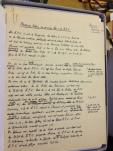I have spent most of today chairing or participating in Zoom meetings. Each one was efficient, disciplined and we did the necessary business. Digital media are seriously wonderful, enabling audio-visual contact with individuals or groups in ways that would have been unthinkable only a decade ago.
But, they are no substitute for the real thing. I noticed today that in one of the meetings we got the job done (in a non-Brexitty way, of course), but we lacked the incidental chat, the in-between keeping up with people, spotting the indexical signals that sometimes belie or qualify the words we use.
The truly face-to-face will one day return and, no doubt, will quickly be taken for granted again. But, for now the loss is real. The waiting for its return is not dead time; rather, it is the time for learning to value what we cannot have … in order to re-value it when we get it back.

The original draft of the Barmen Declaration by Karl Barth
I also had a chat on the phone with a friend for whom the particular preoccupations of the bishops are not high on the human priority list. (Which keeps reasonably honest my own calibration of what matters and how the church might be seen – or not – from the outside.) We talked about faith and where it ‘lives’, especially for those who claim simply not to have it. And it led me back to another chunk of Terry Eagleton (from his book ‘Materialism’, p.49):
Faith is not a solitary mental state but a conviction which springs from sharing in the practical, communal life-form known as the Church… It consists primarily in a commitment to the death, not in a set of theoretical propositions. Even Friedrich Nietzsche … thought that to reduce it ‘to a holding of something to be true, to a mere phenomenality of consciousness, was to travesty it.”
In one sense we don’t need a reminder of this. Faith can never be merely spiritual; it can never be other than visible in how individuals live their common life. This is probably why Jesus never offered a three-line definition of the Kingdom of God, but, rather, told stories and gave images that teased the imagination. Faith is not non-propositional; but, if it is merely trust in a set of propositions, then it won’t last long in the face of the world’s reality.
So, the common life of people of faith will demonstrate the integrity of that faith. Not just it’s efficacy or attractiveness, but also it’s reality and credibility. We can argue apologetics and explore the rationality of faith – but, do stop there and disembody it in communal life is to miss the point entirely. Ultimately, faith is to be exercised and lived and not just for its own sake; it is therefore entirely reasonable in the sense that Eagleton uses it when he writes (p.56):
To be reasonable is to strive to view a situation as it really is, a strenuous enterprise which involves lifting our gaze above our endemic narcissism and self-interest. It also requires patience, persistence, resourcefulness, honesty, humility, the courage to confess that one is mistaken, a readiness to trust others, a refusal of anodyne fantasies and self-serving illusions, an acceptance of what may run counter to our own interests and so on.
